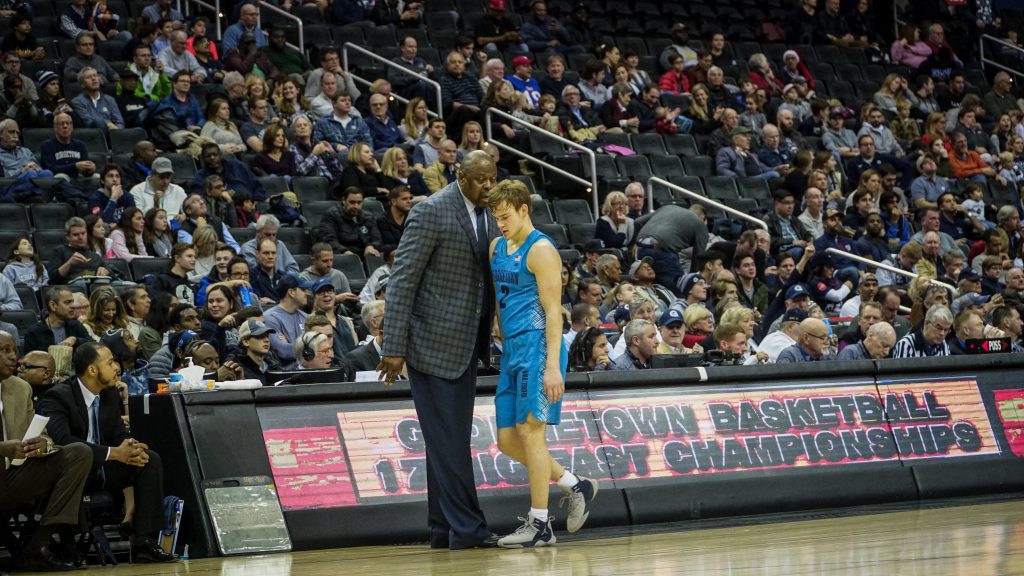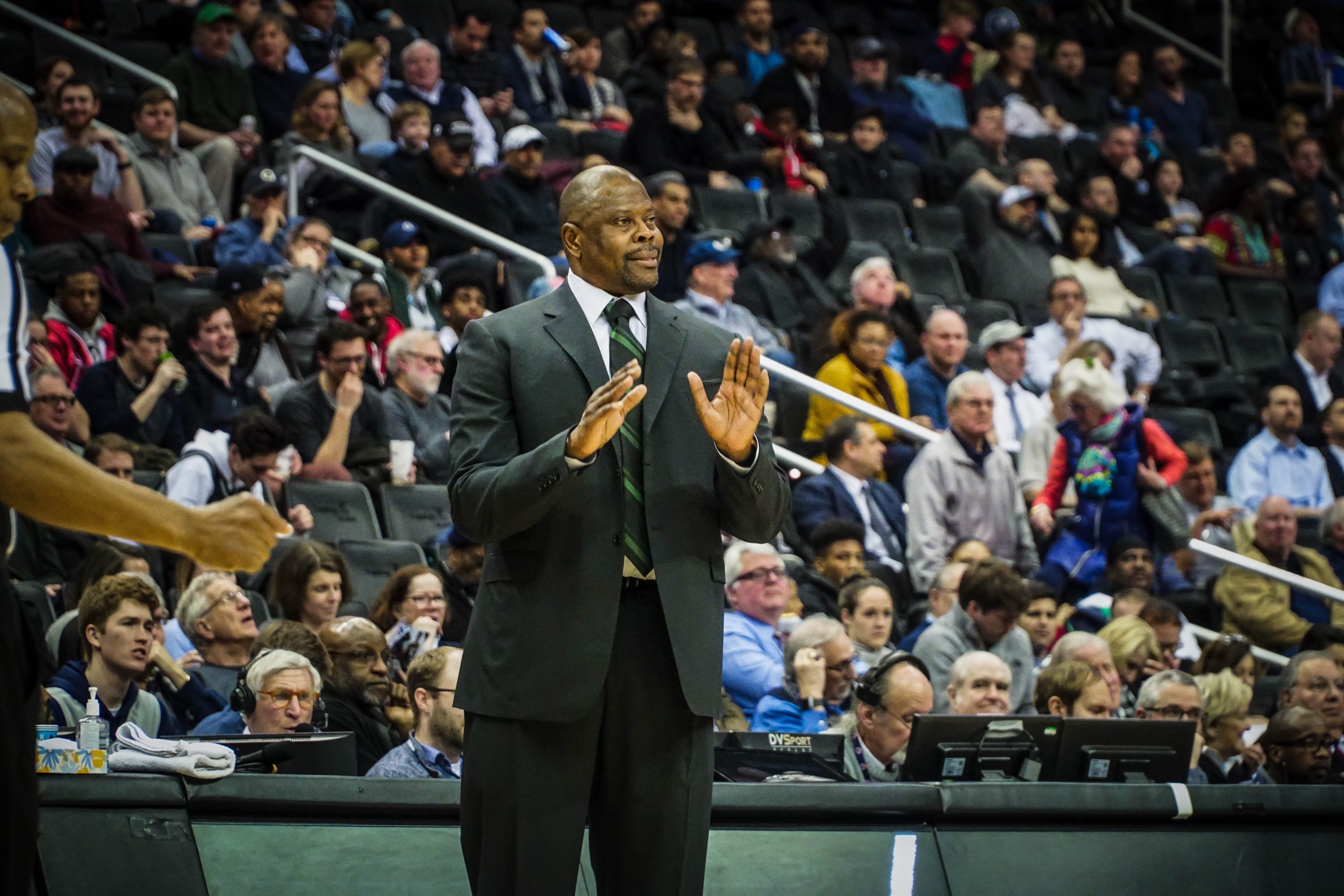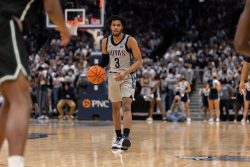Isiah Thomas. Clyde Drexler. Chris Mullin. Mention these players’ names and memories of their illustrious, Hall of Fame careers easily come to mind. Less likely to be revered: their stints as college head coaches. Thomas, Drexler, and Mullin all had their own forgettable runs at the helms of collegiate programs, going a combined 104-177 over their stretches at Florida International, Houston, and St. John’s, respectively.
Patrick Ewing is trying to buck that trend. Entering his third year as Georgetown’s head coach, he has put together a 34-29 record thus far, including a five-win improvement in the 2018-19 season after inheriting a struggling program in 2017.
“I think it definitely helps,” Ewing said of how his playing experience contributes to his coaching. “Because at one point, I was sitting in their shoes, hearing whatever the coaches had to say to me. I think I relate to a lot of the things they have to go through.”
For many teams, there is something fundamentally attractive about a coach who has already earned their stripes in the basketball world.
“He walked the walk and he talked the talk,” junior guard Jamorko Pickett said. “He’s been there and he’s definitely dropped that knowledge on us about what it takes to get there.”
Ex-players turned head coaches can inject promise into a struggling program, with the hope they will match their previous success on the hardwood in their new role on the sideline, but that aspiration has seldom seen favorable outcomes.
One exception is Dan Majerle. Majerle, a three-time NBA All-Star, has coached the Grand Canyon Antelopes for the past six seasons. He presided over the team’s elevation to Division I in 2013, and the Antelopes have not missed a beat since, securing winning records in five of six years.
Majerle represents an intriguing model for Ewing to replicate, but he coaches a newly-promoted DI team in the Western Athletic Conference, not exactly comparable to running one of the country’s most historic programs in the Big East.
Perhaps a more appropriate parallel to Ewing is Penny Hardaway, who took over as head coach at Memphis in March 2018 after an NBA career where he was a four-time All-Star. Similar to the Hoyas, the Tigers chose him to lead their program after falling from their former glory, specifically in the 2000s when they were one of the top teams in the country under John Calipari. Like Ewing, Hardaway was a program legend long before he was hired, playing two seasons for the Tigers, including a run to the NCAA Tournament Elite Eight in 1992.
Now, just one season into his coaching career at Memphis, Hardaway’s efforts have already earned national acclaim. Hardaway boasts a 2019 recruiting class with two five-star recruits, including the number one overall player, center James Wiseman, and five four-star prospects. In just two years at the helm, Hardaway has been able to leverage his connections in the Memphis area and his status as a former NBA great to improve the Tigers’s recruiting class ranking from number 50 in the country before his arrival to first.
For comparison, Ewing’s classes have ranked 44th, 31st, and 55th in the three years he has led the Hoyas. While Ewing has secured four-star recruits Jamorko Pickett and James Akinjo, he has not been able to land one of the nation’s elite talents to this point, narrowly missing out on one of last year’s greatest prizes, point guard Cole Anthony.
Although Ewing has not been able to capitalize on his prestige in the basketball community to generate recruiting classes to anywhere near the extent that Hardaway has, there are plenty of other avenues through which college coaches can make the most of their status as former standout players.


Photo by John Picker/The Georgetown Voice Ewing advises Mac McClung, his second-year guard who averaged 13.1 PPG as a freshman. (John Picker/The Georgetown Voice)Photo by John Picker/The Georgetown Voice
For one thing, the respect he earns in the locker room is immeasurable. While other coaches might struggle to have their players listen and take in what they say, Ewing’s achievements speak for themselves, and his team values the chance to learn from a player of his eminence.
“He’s one of those guys, you try to take in everything he says because you know he’s speaking truth, speaking the best for you,” sophomore guard Mac McClung said. “He reminds us every once in a while what he did, but he’s all I could ask for as a coach.”
Under Ewing’s leadership, the Hoyas have not immediately become a dominant force in the Big East, but the team has mostly met expectations over the past two seasons. That said, Georgetown’s postseason play last year was a massive letdown, and this season they’ll look to follow through on their season-long efforts in March. 2018’s impressive freshman class was a boon to his resume, but the continued development of those players, along with how well he incorporates the team’s new arrivals, will be critical to both Ewing and Georgetown’s futures.
A major factor will be the extent to which he can impart the wisdom he gained through his experiences to his young players. “I played for a lot of great coaches,” Ewing said. “I coached with a lot of great coaches, so all of them have definitely influenced the way that I coach.”
Ewing’s wide-ranging basketball experience in different roles and at multiple levels gives him an advantage over other college coaches, but he shares his lengthy tenure in the sport with the other former NBA greats turned coaches. Thomas, Drexler, and Mullin all have played and coached alongside some of basketball’s greatest figures but failed to meet expectations in their coaching endeavors. For Ewing, now going into his third full season at the helm, bringing something different to the table is a necessity.
Senior center Omer Yurtseven, who hopes to follow in his coach’s footsteps as a dominant big man for the Hoyas, feels Ewing’s attitude as a player has carried over to his managerial career and now permeates throughout the team.
“His grit,” Yurtseven said of Ewing’s distinctive attributes as a coach. “He had energy, effort as a player, and as a coach it just wears off. It’s contagious.”
As a player, Ewing was renowned for his toughness and resolve in the face of adversity. He was also known for his unique approach to the game and his commitment to getting the little things right.
“His experiences in the NBA also show the attention he pays to the details of the game,” Yurtseven said. “Whatever situation we face, he has a way of approaching it then solving it quickly that I think is going to be huge.”
While Ewing has quite a bit in common with coaches who have floundered in the past, there is also much that separates him. The Hoyas hope to continue their upward trajectory as they gear up for year three of the Ewing era. To accomplish that goal, they will need their coach to keep preaching those special qualities that made him an all-time great player.
“I just continue to work at it,” Ewing said. “Everyone has to improve, everyone has to get better, and that includes me.”





